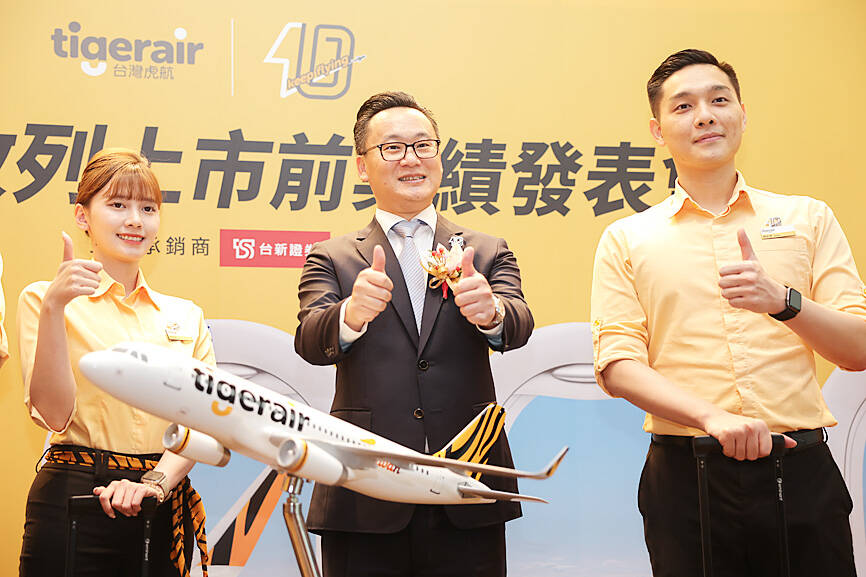Low-cost carrier Tigerair Taiwan Ltd (台灣虎航) yesterday said its operating performance this year would be better than last year’s on the back of an increase in passenger flights and the addition of new routes.
The airline, a subsidiary of China Airlines Ltd (CAL, 中華航空), said that it would strive to distribute dividends to shareholders beginning next year, as it is scheduled to begin trading on the main bourse by the end of this year.
Tigerair’s shares are listed on the Taiwan Stock Exchange’s Taiwan Innovation Board, on which they rose 1.78 percent to NT$68.70 yesterday.

Photo: CNA
“Tigerair Taiwan aims to continue surpassing itself ... and let’s wait and see what’s next,” Tigerair chairman Kevin Chen (陳漢銘) told a news conference in Taipei.
Established in 2014 as a joint venture between Singapore-based Tiger Airways Ltd and CAL before becoming a wholly owned subsidiary of CAL in 2017, Tigerair offers flights to 28 destinations in Asia on 41 routes.
With its fleet of 15 Airbus 320s, the airline has launched 14 new routes amid a global tourism boom in the post-COVID-19 pandemic era, Tigerair said in a statement.
The launch of a new route between Taoyuan and Miyazaki, Japan, on Nov. 26 would mark the airline’s 20th destination in Japan, Tigerair said, adding that it has the most flights to Japan and South Korea among Taiwanese carriers.
Due to the surge in the number of people traveling abroad and the increase in overseas destinations after the pandemic, Tigerair’s cumulative revenue from January to September this year was NT$12.64 billion (US$395.4 million), an annual increase of 39.65 percent and surpassing its revenue of NT$12.47 billion for the whole of last year.
The airline posted net profit of NT$2.48 billion in the first three quarters, the most for the period in its history, or earnings per share of NT$5.52, up from NT$3.17 in the same period last year.
Gross margin and operating margin improved to 32 percent and 26 percent respectively in the first three quarters, the airline said.
With the arrival of maple leaf viewing, skiing, and the Christmas and New Year holidays in Japan and South Korea, the tourism market would remain strong this quarter, Tigerair said.
The airline would continue adding new destinations and routes to serve customers, it said.
International travel demand last year had almost returned to pre-pandemic levels and global passenger demand might grow 3.8 percent this year, the International Air Transport Association said.
The Asia-Pacific region is seen as a key market for further demand growth, the association said.

When an apartment comes up for rent in Germany’s big cities, hundreds of prospective tenants often queue down the street to view it, but the acute shortage of affordable housing is getting scant attention ahead of today’s snap general election. “Housing is one of the main problems for people, but nobody talks about it, nobody takes it seriously,” said Andreas Ibel, president of Build Europe, an association representing housing developers. Migration and the sluggish economy top the list of voters’ concerns, but analysts say housing policy fails to break through as returns on investment take time to register, making the

‘SILVER LINING’: Although the news caused TSMC to fall on the local market, an analyst said that as tariffs are not set to go into effect until April, there is still time for negotiations US President Donald Trump on Tuesday said that he would likely impose tariffs on semiconductor, automobile and pharmaceutical imports of about 25 percent, with an announcement coming as soon as April 2 in a move that would represent a dramatic widening of the US leader’s trade war. “I probably will tell you that on April 2, but it’ll be in the neighborhood of 25 percent,” Trump told reporters at his Mar-a-Lago club when asked about his plan for auto tariffs. Asked about similar levies on pharmaceutical drugs and semiconductors, the president said that “it’ll be 25 percent and higher, and it’ll

NOT TO WORRY: Some people are concerned funds might continue moving out of the country, but the central bank said financial account outflows are not unusual in Taiwan Taiwan’s outbound investments hit a new high last year due to investments made by contract chipmaker Taiwan Semiconductor Manufacturing Co (TSMC, 台積電) and other major manufacturers to boost global expansion, the central bank said on Thursday. The net increase in outbound investments last year reached a record US$21.05 billion, while the net increase in outbound investments by Taiwanese residents reached a record US$31.98 billion, central bank data showed. Chen Fei-wen (陳斐紋), deputy director of the central bank’s Department of Economic Research, said the increase was largely due to TSMC’s efforts to expand production in the US and Japan. Investments by Vanguard International

WARNING SHOT: The US president has threatened to impose 25 percent tariffs on all imported vehicles, and similar or higher duties on pharmaceuticals and semiconductors US President Donald Trump on Wednesday suggested that a trade deal with China was “possible” — a key target in the US leader’s tariffs policy. The US in 2020 had already agreed to “a great trade deal with China” and a new deal was “possible,” Trump said. Trump said he expected Chinese President Xi Jinping (習近平) to visit the US, without giving a timeline for his trip. Trump also said that he was talking to China about TikTok, as the US seeks to broker a sale of the popular app owned by Chinese firm ByteDance Ltd (字節跳動). Trump last week said that he had